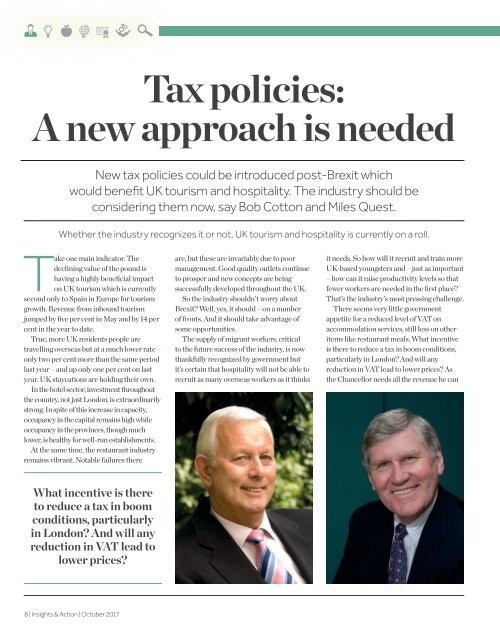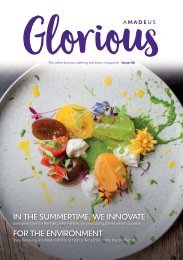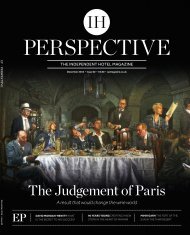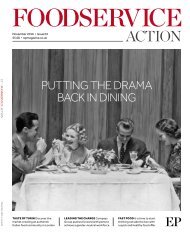EP Insights & Action
Expert observers comment on the Industry. This magazine is designed to bring together the thought leadership, ideas and opinions of leading consultants and operators from across the industry. EP's vision is to create an open narrative and debate that explains the perspective and thinking on the market and Industry. It will help all progress, so let us know your thoughts, subscribe and be involved.
Expert observers comment on the Industry. This magazine is designed to bring together the thought leadership, ideas and opinions of leading consultants and operators from across the industry. EP's vision is to create an open narrative and debate that explains the perspective and thinking on the market and Industry. It will help all progress, so let us know your thoughts, subscribe and be involved.
Create successful ePaper yourself
Turn your PDF publications into a flip-book with our unique Google optimized e-Paper software.
Tax policies:<br />
A new approach is needed<br />
New tax policies could be introduced post-Brexit which<br />
would benefit UK tourism and hospitality. The industry should be<br />
considering them now, say Bob Cotton and Miles Quest.<br />
Whether the industry recognizes it or not, UK tourism and hospitality is currently on a roll.<br />
T<br />
ake one main indicator. The<br />
declining value of the pound is<br />
having a highly beneficial impact<br />
on UK tourism which is currently<br />
second only to Spain in Europe for tourism<br />
growth. Revenue from inbound tourism<br />
jumped by five per cent in May and by 14 per<br />
cent in the year to date.<br />
True, more UK residents people are<br />
travelling overseas but at a much lower rate –<br />
only two per cent more than the same period<br />
last year – and up only one per cent on last<br />
year. UK staycations are holding their own.<br />
In the hotel sector, investment throughout<br />
the country, not just London, is extraordinarily<br />
strong. In spite of this increase in capacity,<br />
occupancy in the capital remains high while<br />
occupancy in the provinces, though much<br />
lower, is healthy for well-run establishments.<br />
At the same time, the restaurant industry<br />
remains vibrant. Notable failures there<br />
are, but these are invariably due to poor<br />
management. Good quality outlets continue<br />
to prosper and new concepts are being<br />
successfully developed throughout the UK.<br />
So the industry shouldn’t worry about<br />
Brexit? Well, yes, it should – on a number<br />
of fronts. And it should take advantage of<br />
some opportunities.<br />
The supply of migrant workers, critical<br />
to the future success of the industry, is now<br />
thankfully recognized by government but<br />
it’s certain that hospitality will not be able to<br />
recruit as many overseas workers as it thinks<br />
it needs. So how will it recruit and train more<br />
UK-based youngsters and – just as important<br />
– how can it raise productivity levels so that<br />
fewer workers are needed in the first place?<br />
That’s the industry’s most pressing challenge.<br />
There seems very little government<br />
appetite for a reduced level of VAT on<br />
accommodation services, still less on other<br />
items like restaurant meals. What incentive<br />
is there to reduce a tax in boom conditions,<br />
particularly in London? And will any<br />
reduction in VAT lead to lower prices? As<br />
the Chancellor needs all the revenue he can<br />
What incentive is there<br />
to reduce a tax in boom<br />
conditions, particularly<br />
in London? And will any<br />
reduction in VAT lead to<br />
lower prices?<br />
8 | <strong>Insights</strong> & <strong>Action</strong> | October 2017
















